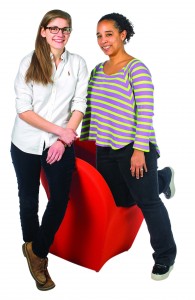
Reprinted and abridged from the Cornell Chronicle, February 9, 2017.
by Daniel Aloi
Jane Mendle, associate professor of human development, was awarded the Stephen H. Weiss Junior Fellowship which has a term of five years.
The fellowship winners were announced by Interim President Hunter Rawlings at a recognition event in the Groos Family Atrium in Klarman Hall.
Established in 1992, the Weiss Presidential Fellowship was conceived by the late Stephen H. Weiss ’57, chairman emeritus of the board of trustees, to recognize tenured Cornell faculty members for the teaching and mentoring of undergraduates. Two or three recipients are named each year; in addition to a respected scholarly career, the recipients have sustained records of effective, inspiring and distinguished teaching and contributions to undergraduate education.
The Junior Fellows Award is given to two recently tenured associate professors each year for excellence in teaching and notable scholarship.
Jane Mendle is a New York state-licensed clinical psychologist who joined the human development faculty in 2011. She directs the Adolescent Transitions Lab, and her research in adolescent psychology includes a focus on how aspects of puberty relate to psychological well-being. She was recommended by the selection committee for her passion for her subject and for teaching, her interactive lectures and creative assignments. Her students describe her as enthusiastic and approachable, and noted her dedication to advising and devoting time to students needing extra help. Colleagues also praised her service on her department’s undergraduate education committee.
Mendle’s research has been profiled by The New York Times, The Washington Post, the BBC, The Economist, USA Today, Newsweek and other media outlets. She has awards from the Society of Research on Adolescence, the Behavior Genetics Association and the Human Behavior and Evolution Society, and was named a rising star by the Association for Psychological Science.


